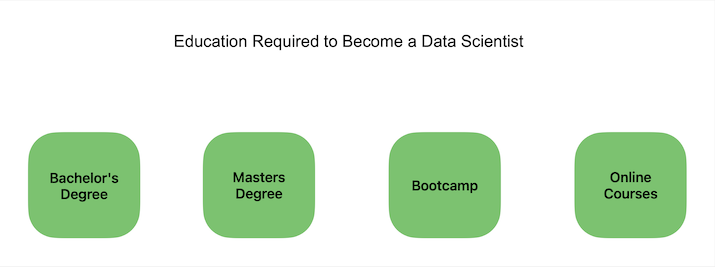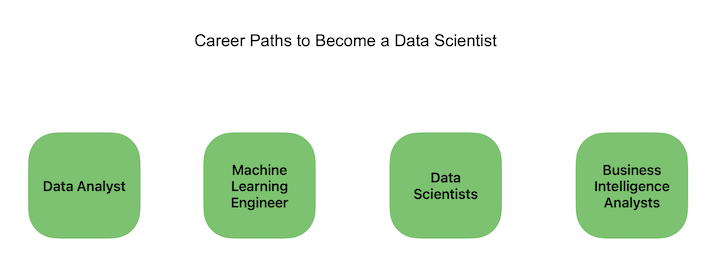
 Data Structure
Data Structure Networking
Networking RDBMS
RDBMS Operating System
Operating System Java
Java MS Excel
MS Excel iOS
iOS HTML
HTML CSS
CSS Android
Android Python
Python C Programming
C Programming C++
C++ C#
C# MongoDB
MongoDB MySQL
MySQL Javascript
Javascript PHP
PHP
- Selected Reading
- UPSC IAS Exams Notes
- Developer's Best Practices
- Questions and Answers
- Effective Resume Writing
- HR Interview Questions
- Computer Glossary
- Who is Who
How to become a data scientist?
Data science is a creative, exciting field that combines an understanding of business, statistics, and computer science to unlock the secrets of data. All kinds of businesses and organizations are eager to take advantage of the limitless opportunities presented by the growing data supply and make more informed decisions. The volume of data produced is astonishing. By using data to streamline their operations, acquire a competitive edge, and get a deeper understanding of their clientele, these forward-thinking businesses are ushering in a new era of business. Obviously, there is a greater need for knowledgeable data scientists who are adept at processing and analyzing data as the demand for data-driven insights has grown.
Whether you're a recent graduate ready to start your career or a seasoned professional looking for a change of pace, this handbook is the ideal place to begin for anybody interested in learning more about the fascinating field of data science. In this post, we will have a look at how to become a data scientist.
Skills Required to Become a Data Scientist
Data scientists need a wide variety of skills due to the complexity and diversity of their sector. The following are essential skills that data scientists must possess ?

Programming skills
Programming is a fundamental competency in data science. Data scientists need to be skilled in at least one programming language, such as Python, R, or Java, in order to modify, transform, and analyze data. Given that it's simple to learn and offers a variety of modules and frameworks for managing and analyzing data, Python is the language that data scientists use the most frequently.
Statistics
On statistics, data science is based. The statistical concepts of probability, hypothesis testing, regression analysis, and data distributions must be properly grasped by data scientists. A thorough grasp of statistical modeling and inference is also necessary to build predictive models.
Data Visualization
The skill of displaying complicated data in an understandable way is known as data visualization. Data scientists need to be able to design engaging visualizations that highlight critical patterns and insights. In data visualization, libraries like Tableau, matplotlib, and D3.js are frequently employed.
Machine Learning
The development of algorithms that can learn from data and provide predictions or judgments is a critical component of machine learning, a sort of artificial intelligence. Data scientists must possess a thorough grasp of topics in machine learning, such as supervised and unsupervised learning, decision trees, random forests, and neural networks. It's also essential to be familiar with well-known machine learning frameworks like TensorFlow, Scikit-Learn, and Keras.
Domain Knowledge
Domain knowledge is the term for competence in a certain sector or business. To be able to formulate the proper queries and arrive at insightful conclusions, data scientists need to have a thorough awareness of the field in which they are working. For instance, a data scientist employed in the healthcare industry needs to be familiar with medical jargon and rules.
Education Required to Become a Data Scientist
Data science is a fast-expanding area that needs a strong educational foundation to be successful. The many educational paths that might assist you in becoming a data scientist are listed below ?

Bachelor's Degree
A career in data science frequently begins with a bachelor's degree in computer science, statistics, or a similar discipline. A strong grounding in programming is provided by a computer science degree, while statistical theory and modeling are covered in depth by a statistics degree.
Master's Degree
A master's degree in a related discipline can provide students with a thorough education and increase their employment options in data science. Advanced subjects like big data, data visualization, and machine learning are frequently covered in the curriculum.
Boot camps
Boot camps are another choice for people who are interested in data science. These are rigorous, condensed Training Courses designed to impart specialized knowledge quickly. Because they provide practical training and experience solving real-world issues, data science boot camps are becoming more and more popular.
Online Courses
Online courses provide a flexible and cost-effective alternative to traditional academic programs and boot camps for learning data science skills. Tutorialspoint, a reliable online learning environment provides a large selection of statistics courses, machine learning courses, and data science courses.
Career Paths to Become a Data Scientist
For individuals interested in the rapidly expanding subject of data science, there are several job options. Some of the most sought-after data science job pathways are listed below ?

Data Analyst
To assist businesses in making wise decisions, data analysts gather, prepare, and analyze data statistically. In order to enhance corporate operations, they analyze data sets to find trends, patterns, and insights.
Machine Learning Engineer
Machine learning systems are designed, constructed, and maintained by machine learning engineers. They create prediction models and automate processes using algorithms and statistical models.
Data Scientists
To analyze big data sets and provide meaningful insights, data scientists utilize statistical models and machine learning algorithms. To comprehend company requirements and resolve challenging issues, they closely collaborate with stakeholders.
Business intelligence analysts
Business intelligence analysts use massive data sets to create reports, visualizations, and dashboards to support data-driven decision-making within organizations. They analyze data and share findings with stakeholders using technologies like SQL and Tableau.
Tips for Successfully Becoming a Data Scientist
-
Understanding the principles and theories underlying data science will be made easier for you if you have a solid background in arithmetic and statistics.
-
To understand how to handle, analyze, and visualize data efficiently, develop strong programming abilities in languages like Python, R, and SQL.
-
Take part in practical projects or internships to acquaint yourself with the difficulties the industry encounters and acquire experience handling data in a realistic setting.
-
You can remain updated with the newest tools, tactics, and trends in data science by consistently taking part in conferences, seminars, and online courses.
-
Develop strong communication skills if you want to deliver data-driven insights to non-technical stakeholders successfully.
-
Finally, create a strong professional network by participating in data science groups, attending industry events, and networking with colleagues and mentors. Throughout your career as a data scientist, a strong network can offer supportive relationships and important career opportunities.
Conclusion
As we come to a conclusion, it is abundantly clear that a successful data scientist requires a strong educational foundation in addition to a combination of technical and soft skills. Data scientists, machine learning engineers, data analysts, and business intelligence analysts are just a few of the intriguing careers one may follow in the very dynamic field of data science. Given the growing significance of data in today's decision-making processes, there will always be a need for qualified data scientists. You can develop a fulfilling career in data science that is sure to keep you interested and happy by continually honing your abilities and keeping up with the most recent tools and approaches.

